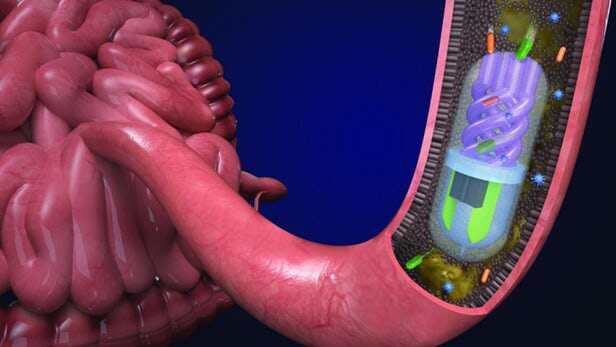According to New Atlas, excessive or lack of certain types of intestinal bacteria is thought to be associated with various diseases such as depression, heart disease and childhood asthma. However, it may be difficult to non-invasively determine which microorganisms constitute the human "intestinal microbiome" - this is why the researchers decided to develop new 3D printed capsules.
This orally ingested capsule was created by a team at Tufts University in Massachusetts to collect a variety of bacteria as it passes through the gastrointestinal tract. Once it is excreted in the feces, the capsule can be removed and its contents analyzed. It consists of two internal chambers separated by a semi-permeable membrane. One of these chambers contains a helical (spiral) microfluidic channel in which bacteria collected from different stages of the gastrointestinal tract are stored. The other contains a calcium salt that produces a permeate flow through the membrane that draws bacteria from the exterior of the capsule into the passage in the first chamber.

The surface of the capsule is covered with a pH sensitive coating that does not dissolve until the capsule passes through the stomach. This makes it not collect bacteria before reaching the small intestine, which is where the true intestinal microbes act. Additionally, the small magnet within the capsule allows it to be manually held at a given point within the gastrointestinal tract simply by holding another magnet on the patient's body at that location.
Currently, in order to determine which bacteria are present in a person's intestines, scientists look for microbial DNA and metabolites in the person's stool. However, unlike the case of capsules, this method does not well indicate what the microbiome in the upstream of the distal colon is - this is the area where there may be significantly different types of bacteria.
“We have advanced technology for analyzing bacterial populations using DNA sequencing, but until now there has been no way to sample bacteria in the entire gastrointestinal tract in a non-invasive manner,” said Hojatollah Rezaei Nejad, a postdoctoral researcher and lead author of the paper. “By non-invasive sampling, this capsule helps us better identify and understand the role of different gut bacteria in health and disease.”
So far, the technology has been successfully tested on pigs and non-human primates, but has not yet been tested in humans. Related papers were recently published in the journal Advanced Intelligent Systems.


